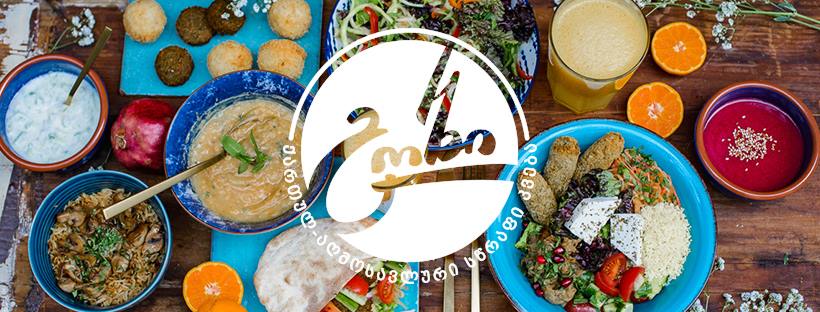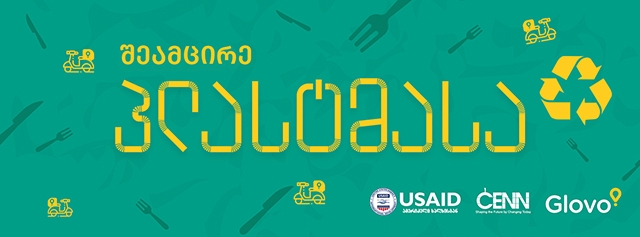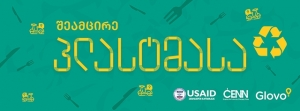Glovo Joins USAID, CENN Environmental Campaign #SayNoToPlastic
We throw away billions of utensils every year. Like many plastic items, plastic cutlery often finds its way into the environment, where it poses dangers for animals and can take hundreds of years to break down.
Currently, plastic cutlery is listed as among the items “most deadly” to sea turtles, birds, and mammals, and alternatives have proven particularly hard to come by, though not impossible.
To target the issues related to plastic cutlery and reduce its use among Georgian society, on October 25, 2019 with the support of USAID and CENN, the large-scale environmental campaign #SayNoToPlastic was launched. The campaign aims at reducing environment pollution from plastic. Active and motivated youth, CENN partner organizations, embassies operating in Georgia, international organizations, well-known actors and journalists and other stakeholders are getting involved in it.
The #SayNoToPlastic is a social media campaign, calling on the public to reduce their consumption of disposable plastics in their daily lives and to replace them with reusable items. The participants of the campaign upload photos depicting their changes in behavior on social media under the title #SayNoToPlastic.
One of the largest companies that has recently joined the campaign to contribute to environment protection throughout the country is Glovo, a multi-category lifestyle app with food delivery being the most popular offering, which is actively used by Georgian customers due to its comfortable and quick service.
As part of joining the campaign, Glovo has added an eco-friendly category to its application, within this category the customers can either refuse to order single-use plastic cutlery or, if available, order wooden alternatives.
Along with Glovo, the following partner restaurants have joined the campaign: Kiwi Vegan Café, Goby, Gomi da Kveli, Manji, Macaroni, Greek Point, Pazza, Nocco, Soup Culture, Pho, and Frieteria.
GEORGIA TODAY spoke with Shalva Iosava, the Head of Glovo Georgia, about the company’s collaboration with CENN, the various activities it implements in terms of environment protection, and future plans in this direction.
Glovo joined the #SayNoToPlastic campaign. Why did you decide to be a part of it and what steps does Glovo take within the new partnership?
One of the Glovo's core values is “Care,” which is shared by all employees of the company. It not only means to care about app users, but also to have a sense of global citizenship and social responsibility. In all countries where Glovo operates, the company always strives to reduce the negative impact on the environment and it helps numerous local and international NGOs. Since active care to raise awareness on plastic pollution in society, and taking concrete steps to address this problem, is essential in the delivery service industry, Glovo decided to join USAID/CENN’s Waste Management Program, and we hope that many other partners will join this social responsibility project in the future.
Glovo added an eco-friendly category to its app. Tell us what it means.
Glovo and several of its partner restaurants have joined the campaign against polluting the environment with plastic waste, #SayNoToPlastic. The involved restaurants in the app will be placed under the filter: ‘No to Plastics’, while users of these facilities will be able to refuse plastic containers and utensils, use only eco-friendly items instead, thereby reducing environmental pollution. Customers who have the most orders from restaurants involved in this campaign will be given a Glovo gift card and various other gifts each week. By doing so, we strive to encourage both our partners and customers to take care of the environment together.
In addition to reducing the use of disposable plastic cutlery, what activities does your company plan to further expand eco-friendly activities in future?
We are starting with the #SayNoToPlastic campaign; however, Glovo will always join any social responsibility campaign aimed at reducing the ecological footprint in the delivery industry, with pleasure.
* * *
GEORGIA TODAY also spoke with representatives of restaurants involved in the campaign to find out more about their motivation and the activities they implement in order to reduce environment pollution from plastic.

“Kiwi Vegan Café has always been careful about its environmental impact and we have always tried our best to choose the most eco-friendly products and the greenest ways of doing things,” says co-founder and director Soroush Negahdari. “That said, we were more than glad to join the #SayNoToPlastic campaign. I believe that campaigns like this will help restaurants to avoid using unnecessary plastic items without causing any customer dissatisfaction. Before this campaign, and since Kiwi’s earliest days, we have been using paper and aluminum dishes, bags, containers and straws instead of plastic, and we have always dedicated a portion of our income to buying more expensive but more environmentally friendly alternatives. We do not use plastic dishes or bags for our takeaway orders, and even before the campaign, we provided our clients with disposable cutlery only when they asked for it. Besides, most of our take away meals are prepared in a way that they can be eaten without any need for disposable cutlery (e.g. wraps, sandwiches, burgers, etc.)
In the ‘no plastics’ category, customers will also find Georgian-Asian and vegan restaurant Goby.

“Our company decided to get involved in the campaign primarily because we are a vegan restaurant, contributing to the popularization of vegan cuisine, which means that we care about animals and ecology in general,” said Gobi founder Nato Kvavilashvili.
“This is essential today for our country and environment. For this purpose, everyone should try to reduce the consumption of plastic and polyethylene as much as possible. We wanted our company to contribute to the implementation of this project, to protect the environment and also to encourage others to do so”.
With this campaign, everyone can contribute to protecting the environment. It is a part of the Waste Management Technology in Regions (WMTR) program implemented by CENN with the support of USAID. The program assists the Government of Georgia to modernize the country’s waste management sector and supports sustainable development and inclusive economic growth, ensuring responsible management of natural endowments that minimize adverse impacts from waste on human health and natural resources.
“The #SayNoToPlastic campaign is aimed at companies just as much as individuals. If companies and organizations can establish sustainable practices and give their customers an option to choose environmentally friendly products, the results will be much bigger and systematic. Often, as consumers, we are faced with the issue of not having other options and this is an excellent example of how businesses can offer that choice and encourage positive change in behavior, one that yields real results and has a lasting impact,” note representatives of CENN.











